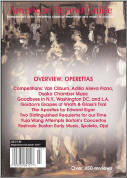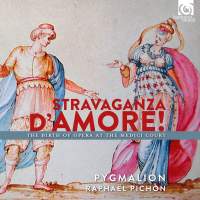Texte paru dans: / Appeared in: |
|
|
Outil de traduction ~ (Très approximatif) |
|
|
Reviewer: John
W, Barker At first glance, we might seem to be offered a newly discovered counterpart to the famed intermedio collection for the play La Pellegrina of 1589. But it is no such thing, even though it is constructed to parallel that landmark cooperative venture. It is, rather, an artificial pasticcio meant to serve this album’s argument. The argument is hardly an original one: that the extravagant dramatic bundles, or intermedii developed for the Medici court in Florence (usually for celebrations of grand dynastic marriages), on the one hand, and the origins of the new form of opera, on the other, belong to a single evolutionary process, leading logically from one to the other, as part of the genesis of monody. All of that went on, of
course, while that great
codifier of opera, Monteverdi (not a musical contributor here), was creating
his benchmark Orfeo.
All of this adds up, in blunt
fact, to a hodge-podge. One might take the editors at their word and
actually follow the structures and stories of these artificial intermedii,
which will certainly be enjoyable. Or one may take it as just one big
concert of late-16th and early-17th Century vocal and even instrumental
music, with a variety of types represented. There are pieces that reflect
the traditions of the Italian madrigal, some that illustrate late
Renaissance lute song, and goodly demonstrations of the early monodic idiom
out of which came the mature solo-singing portrayal of specific dramatic
characters. Even just taken as a big concert, the musical contents here are
a grand feast. Their enjoyability comes, of course, from the real artistry
Pichon has mustered for this venture. There are 12 solo singers in all,
seemingly young ones, who take roles, big and small, with handsome singing
and fine expressive effects. I found particular joy in the work of the
chorus of 24 mixed voices, who bring to life excitingly a lot of terrific
music. The “orchestra” consists of 27 period-instrument players who serve a
variety of duties with unfailing color and precision. The set is packaged in
a book-bound album of oblong size, containing extensive background essays in
French, English, and German, sprinkled with lovely illustrations, and—most
important—full sung texts with translations. In sum, I find this an
absolutely delightful
release in
every way. | |
|
|
|
|
Cliquez l'un ou l'autre
bouton pour découvrir bien d'autres critiques de CD |
|




